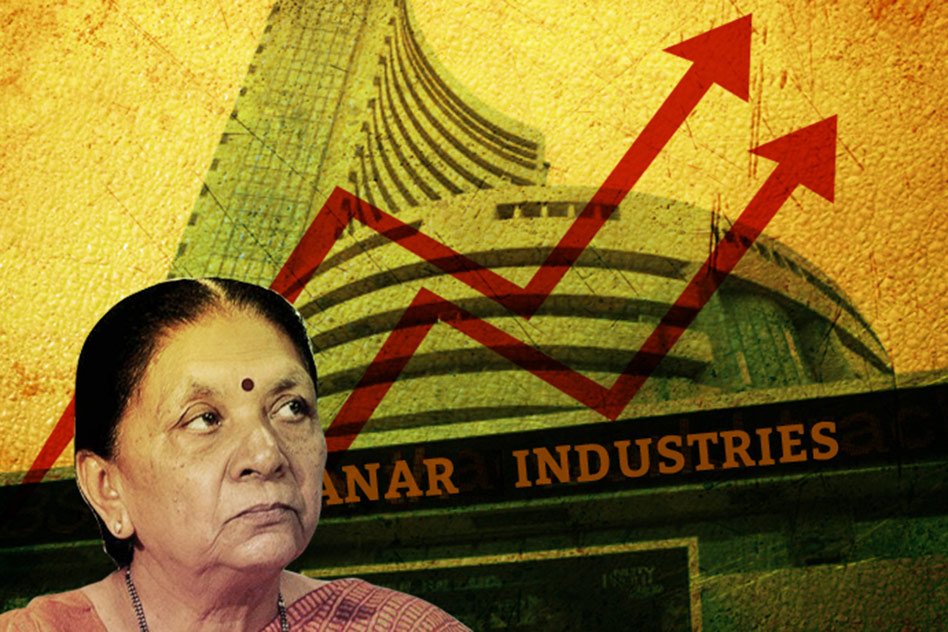Originally Published on catchnews | Reporter: ATUL CHAURASIA
The anomaly
- Anar Industries has seen a meteoric rise in market value since July 2014
- It is owned by Shwetank Patel, son of Gujarat CM Anandiben Patel
More in the story
- What does the company do?
- Is there a rationale behind the meteoric rise?
A few days ago, the media was abuzz with reports of Narendra Modi’s rebuke to Gujarat Chief Minister Anandiben Patel. The Prime Minister reportedly asked her to dispel the “wrong impression” about her children’s “role” in the government’s decision-making, the media reported, citing sources close to the PM.
There is a growing perception in Gujarat that Patel’s son Shwetank and daughter Anar are emerging as parallel power centers, influencing governance in their vested interests.
Anar, 44, runs real estate company Anar Projects Ltd. Her brother Shwetank owns Anar Industries Ltd (AIL), which is listed on the Bombay Stock Exchange. According to the company’s website, it is an “integrated construction, infrastructure development and management company.”
Anar Industries has been a favourite among investors for quite some time. The share markets have seen turbulent times during the past one year. But, the company’s phenomenal growth seems to have defied all logics of the market. Its share price has increased by a whopping 850% since July 2014.
A single share of AIL, which sold at Rs 7.63 on 25 July, rocketed up to Rs 60.45 at one point before receding to close at Rs 44.85 on 5 February. It is hard to miss the inordinate nature of this leap. The background, business activities as well as the financial health of the company do not conform to this stupendous rise.
Anar Industries was established in 1992. Shwetank took over as its managing director in March 2011. According to its annual reports the company never made a profit in its more-than-23 years of existence.
In 2014-15, it recorded a net loss of Rs 70.61 lakh – almost four times the loss of Rs 18.41 lakh the previous year, which was again Rs 4.76 lakh more than in 2012-13.
The story was the same in successive annual reports. But, this has not deterred the exponential rise in the company’s stock value. The company’s latest annual report even expressed inability to pay dividends owing to losses. However, it promised to expand business, hoping for a good investment.
Software, hardware and internet service are said to be AIL’s main domain. It decided to venture into the construction and infrastructure sector in 2012. The past few annual reports claim the company is active in this sphere. Yet, it does not have a single project to its name on the ground.
Despite consistent losses and little activity on the ground, AIL’s investors earned 163 per cent return during last three years. How can a loss-making company give such windfall profits?
Is this normal?
“We see unusual rise in stocks of some companies despite weak fundamentals. Political connections at high level can make it possible,” explains an equity market expert on the condition of anonymity.
He cites an example to clarify his point, “The shares of companies belonging to Adani Group sky-rocketed before the general elections. This happened without any major improvement in the economic fundamentals of those companies.”
“The market insiders are aware of the political links of industrialists and they cash on it. There is every possibility that AIL witnessed sentiment-based growth after Anandiben became the CM. The market forces could have worked on the assumption that company has bright future prospects,” he further elaborates.
Another market analyst Abhishek warns towards the downside of investing in such companies.
“Reliable companies grow at a consistent rate. It is not possible for any company’s shares to grow from Rs 7 to Rs 60 within a year, unless some artificial market forces are at work. Sometimes, monopoly of speculators lead to such unnatural rise, but it is always short lived. Therefore, investment in such companies can never be safe,” he says.
The graph of AIL’s growth raises doubts for other reasons. Several infrastructure companies were showing negative returns when it was giving 163 per cent profit to investors.
For example, SAT Industries recorded negative return of 10.90 per cent during these three years. Similarly, Empower India could only manage returns of meagre 3.13 per cent while Navketan Merchants Ltd and Sun & Shine Industries showed no returns at all.
AIL shares have given a return of 23 per cent during the last month. In contrast, investors of Sun & Shine Industries suffered a loss of 14 per cent during the same period.
These figures leads to the intriguing question; how does AIL shares offer such payback at a time when Infrastructure sector is going through a lean period? Its stock value has never gone down after July 2014, two months after Anandiben Patel took oath as Gujarat CM.
Shwetank Patel and his wife Heena Patel owns a majority of shares of AIL. The company has two other directors. According to 2014-15 annual report, these four promoters possess 74.98 per cent equity. It comes to around 47, 49,589 shares in absolute numbers.
Shwetank is the biggest shareholder in the company with total 2,735,369 shares (more than 50 per cent). Private investors own rest 23 per cent shares. Whereas, financial institutions have bought only 1350 shares (0.01 per cent) of the company.
Is all well?
According to market experts, this is not a good sign for any company. The shareholding of financial institutions is considered as barometer of financial health of any enterprise.
Lesser the share of financial institution, more uncertain the company’s future is likely to be. As the data suggest, the financial institutions have clearly stayed away from the company.
In 2015, NRI businessman Roshan Shah had launched a complaint against AIL’s retail venture with SEBI. He alleged the company lacks real structure for functioning and it is run from the ancestral house of Anandiben Patel. Shah wanted to know why it is still finding favor with the investors.
Shwetank responded with counter allegations against the complainant. He accused Shah of financial misappropriation but failed to explain how it absolves his companies of accountability.
Both Shwetank and Anar Patel’s companies are said to wield a considerable influence in the local real estate market. The Prime Minister was perhaps referring to this ‘impression’ in his meeting with Anandiben.
It is she, who holds the portfolios of revenue and Urban Development. This puts the Chief Minister in dock. All attempts to contact Shwetank Patel and Heena Patel in this regard proved futile. Calls to their cellphones went unanswered. None of them have so far replied to the queries sent through e-mail.
Edited by Joyjeet Das
Read More At: catchnews











